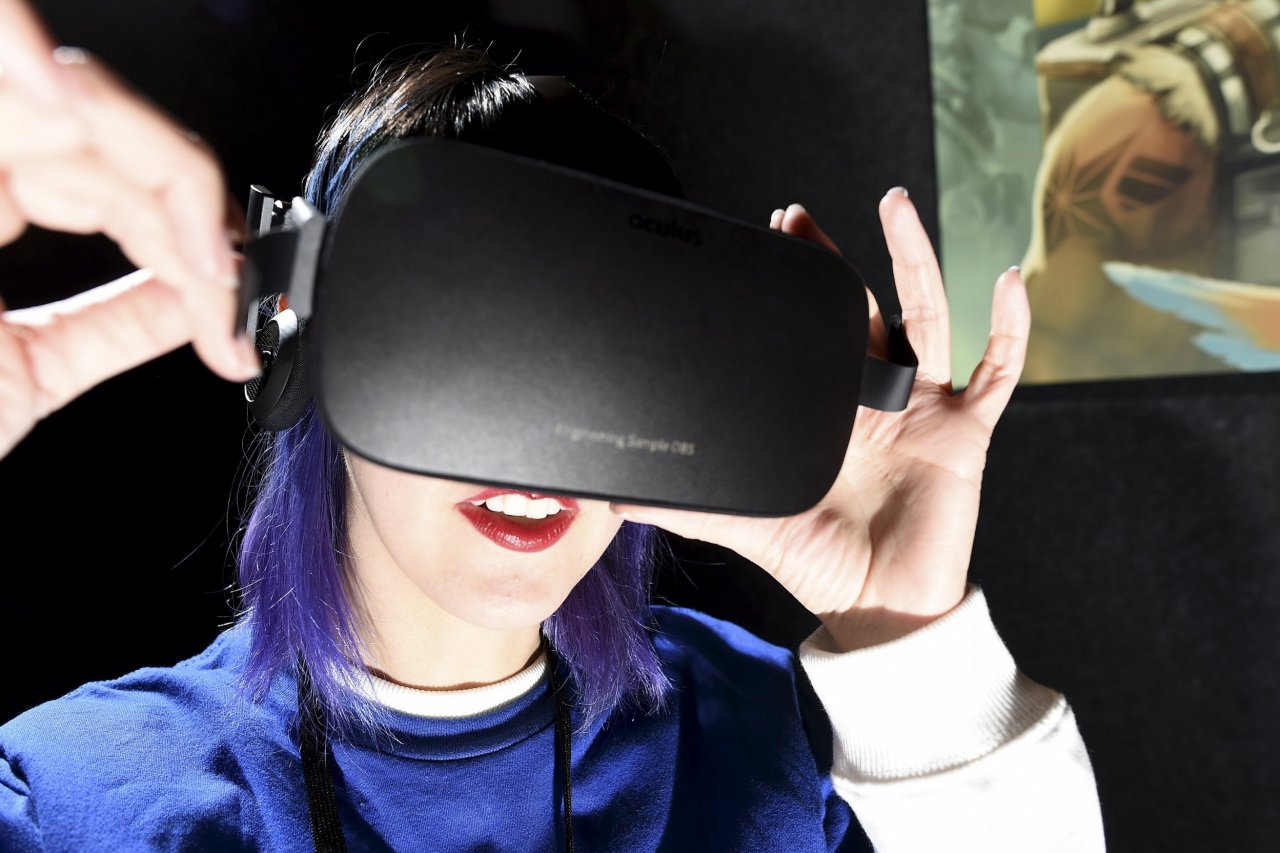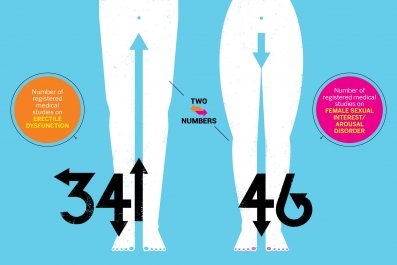Oculus Rift, the device that kicked off the current rush on virtual reality (VR), was really invented in 2011, when 18-year-old Palmer Luckey, working in his parents' garage, made a prototype that wowed the world. It's been five years since then, plenty of time to develop consumer-friendly software like video games, to let competition take hold—and for the hype to build and build.
Last summer, at age 22, Luckey was on the cover of Time magazine, barefoot and floating, tethered to the Earth only by the umbilical cord of his Oculus. It was an image showing a technology yet to be birthed. And now it's here. Oculus is coming to homes March 28, chased just days later, on April 5, by the HTC Vive, another consumer VR device. And then there's Sony's VR headset, which will work with the PlayStation and is expected to arrive in October.
A day after playing half a dozen games built for the Oculus at the Game Developers Conference in San Francisco, I can say the technology is stunning, and there is no question that hard-core gamers—the type that spend thousands of dollars on their PC setups and worry about things like frame rates—are going to be wowed (9,500 of them have already shelled out for Oculus's Kickstarter). But what about the hoi polloi? Will the casual gamers and the console users bite? Is the gameplay on the new VR sets so good it can create a gaming revolution as big as the original Nintendo or the DVD player?
It seems that the first set of VR games convincingly offers a huge upgrade over existing game technologies, not just for the game nerds but for casual gamers as well. There was even a moment that made the hair on my arms stand up and, with its potential, touched that rare thing in commercial entertainment: true art. And yes, I even fell out of my chair once.
The VR war will probably be won by whichever side captures the casual gamer. Released in 2006, the Nintendo Wii was an instantly fun console with intuitive controls that worked around cartoonishly simple games; it wound up selling more than 101 million units, almost twice what PlayStation 4 and the Xbox One have sold—combined. Nintendo couldn't hold on to its newfound market advantage, however. The Wii's downturn in sales coincided with the rise of smartphone games; Candy Crush soon replaced Wii Sports for people who play games on the side.
If Oculus or its other VR competitors really want to start an entertainment revolution, they'll have to do more than impress those who have mastered Call of Duty. They'll have to find a place in your family's living room. And it seems as if Oculus has put a lot of thought into just that.
The most jarring part of playing on an Oculus is the strange sensation you have of navigating two spaces at once. You put on a helmet and start hearing and moving in a very convincing new world, but you're still hearing voices from the old one. Maybe this is the way someone who didn't grow up with television felt flipping one on for the first time. It's a sensation that makes the games feel more tangible and engaging than anything else I've ever played, but it also makes them more taxing. I often required a few minutes of reflection after diving into a virtual world before I was ready to jump, like Dr. Sam Beckett in Quantum Leap, into the next.
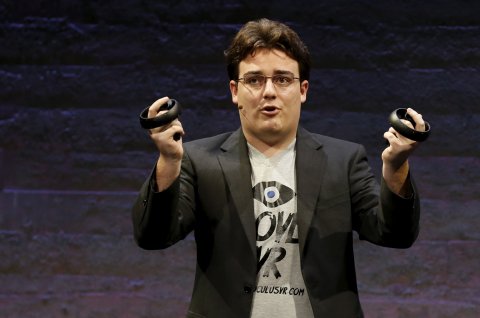
Wearing a blue Hawaiian shirt, baggy cargo pants and sandals, and sporting a convincingly mussed haircut, Oculus's inventor wandered between game demos at the conference. Asked about the whiplash from jumping in and out of worlds, Luckey told Newsweek he's gotten used to it. And I'm sure he has. The California native says he's played every one of the 40-plus games that will launch in the coming months for the Oculus Rift.
The Oculus will ship with one game included: Lucky's Tale, a thoroughly enjoyable Super Mario Bros. clone that both showcases what Oculus can do and makes it clear that the company sees a future beyond high-definition shooters and racing games. Although your first reaction to VR might be hoping that you can explore vast new worlds, Lucky's Tale is more like an intricately detailed train set on a table. Cool, yes. But it's not quite Johnny Mnemonic head-hacking.
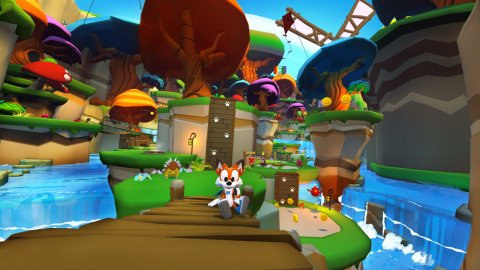
But what Lucky shows is that the headset gives players an intimacy with their characters that can't be matched on a 2-D TV. Lucky's developer, Paul Bettner, the CEO of Playful Corp., told me he was trying to create a "Calvin and Hobbes" relationship between player and character. Leaning in close to Lucky, a red fox with a blue cape, you can see his eyes follow you—he even jumps back if you get too close. You didn't feel like Lucky's pilot as much as his teammate, and that leaves a lot of room to connect emotionally with the little guy.
Currently, one of the hottest types of games for casual gamers, especially on phones, is the "tower defense" game. In these games, there's a line of bad guys who rush your base. You have to build defenses to stop them and blow them up. The most popular series in this genre is Plants vs. Zombies , a huge hit with casual gamers. Defense Grid 2 is a more complicated (and much prettier) tower defense game, and its developer, Hidden Path Entertainment, is porting the title to Oculus.
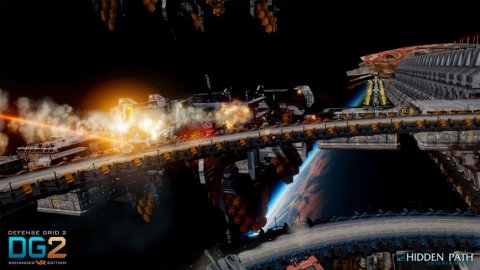
With Defense Grid 2, the simple mechanics and repetition that make tower games so easy to start and so hard to quit on your smartphone are all in play, but the actual controls are much different—and far superior. Your cursor is controlled with your vision. I worried that I would have to swing my head wildly to move in the world, but the controls proved as subtle as moving your focus around a room IRL.
Defense Grid 2's action takes place in a glorified Warhammer 40k world, with floating space platforms and laser turrets. As with Lucky, this game works by letting you feel as if you're watching a great tabletop game unfold. You can lean in and look at the gorgeous details of space stations, where every grate covers a moving part and Easter eggs hide underneath spaceship launch tubes. It's a casual game made fascinating with nearly endless 3-D detail. Defense Grid 2 will cost $29.99 and will be available with the Oculus Rift's launch.
I Expect You to Die, a game named after the phrase thrown at James Bond in seemingly every installment in the film series, is a puzzle adventure where you have to guide a super spy out of deadly situations. You need to open doors, read manuals, shoot guns and reason your way out of each level. And as the name suggests, you have to be prepared to die, a lot. Each misstep in the game is another death, and you'll make many.
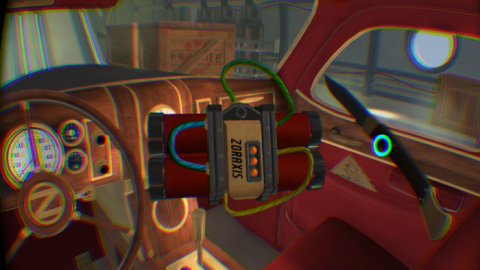
I Expect You to Die actually puts you behind the eyes of its protagonist—and it shows some of the limitations of the first-person view, namely moving around. The Oculus can make you sick fast if a game doesn't work hard to keep you from feeling swung around. The developers of I Expect You to Die limit the visual swings by often anchoring their spy to one spot, like the seat of a car loaded in the back of a freight plane that's filling with poison gas. It's limiting, but it works. And it was here that I leaned over to rest my hand on the virtual car's center console while I reached to grab an item, and toppled over like an ether-drunk Hunter S. Thompson. Phew, I thought. I have an amusing anecdote for my article.
I Expect You to Die requires the Oculus Touch controllers, which won't be released until the second half of the year. Like a lot of the successful Wii games, this one is short and sweet, with four to five hours of playtime.
The Oculus has the chance to wow with its visuals. Nowhere is that more apparent than in The Climb, a first-of-its-kind rock climbing simulator by Crytek, a gaming studio best known for first-person shooters and its 3-D engine, which creates gorgeous open spaces. In making its first move to VR something beautiful and approachably nonviolent, Crytek seems to going for a broad, family-friendly audience.

In The Climb, players stick to a wall, pause to chalk their hands and swing like monkeys, hoping to hold that edge just a second longer. Here the first-person view works to make a game that's as thrilling as it is beautiful. One level is loosely based on Halong Bay in Vietnam, and another on the Alps. Falling is a visceral experience, even if you're expecting it. And level successes are rewarded with stunning views of scenery so real you'll find yourself trying to stay away from the edge. The Climb is due out in April and will cost $49.99, offering 4½ to five hours of playtime.
When asked if other Crytek titles are coming to VR, like perhaps the Crysis first-person shooter series or the giant sandbox games Far Cry, Elijah Freeman, a Crytek executive producer, smiled and said, "I certainly hope so."
There was one moment I experienced that felt like true art: When I donned the Oculus helmet one last time and jumped into the world of Fantastic Contraption. The game uses some of the simple rounded graphics that made many of the Wii games work. Players find themselves on an island under a robin's egg blue sky. Look up toward the sun and you'll see the silhouettes of fish, giving it a slight dreamlike feel and making it a little less clear where exactly you are.
At your side is a pile of sticks, balloons and engines. Your goal is to make a contraption that will move a ball from one side of the island to the other—around, under and over a series of increasingly complicated obstacles. Before you don the VR device, you'll have to move your living room's coffee table for this one because you're going to need some real-world space. To play Fantastic Contraption, you have to crouch and stretch in real life so you can make machines in the virtual world.
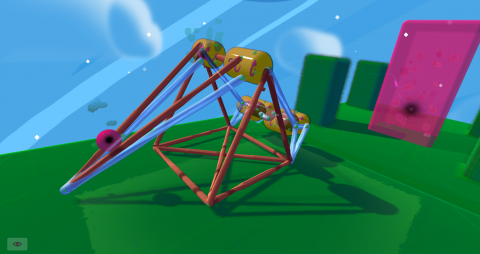
It's a perfectly executed game you can imagine playing with your grandparents or your preschooler. What gave me tingles, though, was how tactile the cartoonish world felt.
In Fantastic Contraption, the player can move every single object, and that makes it feel like a real place, even if it doesn't have the views of The Climb. If you want to try to cheat and throw the ball instead of building a machine to move it, you can try. It just won't go far. You choose your level by picking up a model of it and moving it to a workbench. In one of the most mind-bending parts of the game, you pick up a virtual helmet and put it on—instantly, you're transported to the "save" room, a virtual space inside of a virtual space. When you're done saving, you remove your virtual helmet and are back on the island, with your real-life helmet still secured on your head.
Fantastic Contraption is the product of a tiny game studio and has been nominated for an Independent Games Festival award. Lindsay Jorgensen, a designer who worked on the game, says it works because the team labored to "never say 'no' to the player." And the result feels as if you've actually landed in your childhood sandbox—but with superpowers. Fantastic Contraption will also require the Touch controller and won't be ready for the Oculus launch next week.
It was a thrilling reminder of not just what independent games can do for big systems but also of the amazing worlds we have to look forward to in VR. Oculus or its competitors will certainly change games, but their first offerings show they're also going to be more than a top of the line Formula 1 car for hard-core gamers. They're going to win over Mom too.



